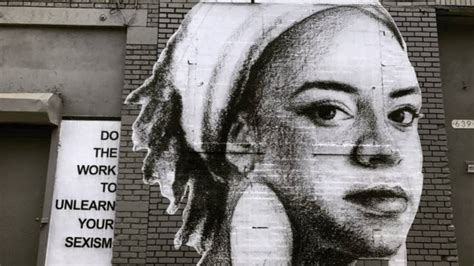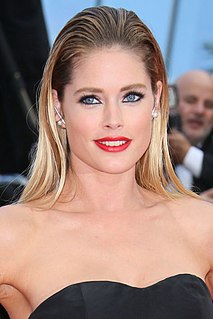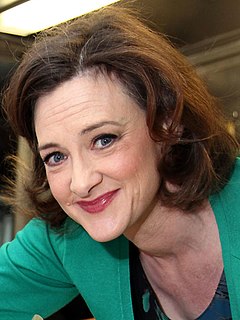A Quote by Jessica Valenti
The Internet is the new public space. And because women are out in public, people don't like that in much the same way that if you're walking down the street you get harassed. I think the same kind of thing happens online, and I think that's why a lot of women are hesitant to put their voice out there.
Related Quotes
It doesn't matter what word we use, if it has the same content, it will be treated in the same way. There are other words - there's "womanist," there's "mujerista," there's "women's liberationist" - all mean the same thing and they get the same ridicule. I think we just need to choose what word we feel comfortable with that says women are full human beings, and whatever that word is, it will get a lot of opposition. But it will also attract a lot of support. But this is a revolution, not a public relations movement.
I feel like we're looked at as either completely nonsexual characters or overly sexual characters, and I feel like that affects how we're treated in the public space by men. I believe that women of color experience street harassment in a very hyper way. So I wanted to draw these women in their very normal, regular states and put those images out there in the public for people to see, instead of these other, very sexualized, images of women.
Most women who are harassed don't come forward, they don't complain because they're skeptical of the process, or they don't think anything is going to come of it if they are found to have been harassed. We know from some very public cases that sexual assault isn't always punished even by the courts in the way that they should be. So, we have got to figure out, how are we going to embed women's experiences in the processes, so that they trust the processes, that there are fair investigations that get to the truth, and then there is appropriate punishment when abuse occurs?
I think that can also be the downfall at the same time in what's really difficult about being kind of in the public eye, you have so much exposure through the Internet, and you can receive a lot of comments, and you get kind of immediate gratification, but also immediate response from people that can either be negative or positive. But I'm really thankful for the internet because it's allowed me to connect with people so much more easily.
I think that the ideal of young womanhood as it's seen in pop culture specifically is a really kind of vapid, conceited, concerned with money and looks kind of thing that you'll see in a lot of reality shows. And I think that's really damaging, not just because it's a terrible role model to put forth, but that it also puts across this idea to the American public that this is what young women are like, that this is what all young women in America are like.
The reason I love blogs so much right now is that I am seeing more critical voices appear, and that's kind of thrilling. I think a lot of critics in their forties or even their thirties have had their voice scared or trained out of them by the academy. I have nothing against the academy. I think it's brilliant and fantastic, but I also think that it's become almost monolithic. The same way a lot of art looks the same, a lot of writing can sound the same and quotes the same theorists.
When you sit down and write a song, you kind of have the idea for the song, and you sit there at the piano and you kinda just write it. And then of course later there's some dinking around with it and changing some stuff. But there's this thing that happens when the song first comes out, that sort of magic when it first comes out of the ether, and you can't even really explain where it comes from. That happens so much with music, and people understand that with music. But I really think that a lot of movie and TV should be the same way.
Sometimes when I pose for pictures, people say it's impossible that I have a flat stomach without working out like crazy and having a personal trainer, and sometimes they get mad at me, and I find that hard because I think there's a lot of women who have the same thing happening to them because they lived a healthy, active lifestyle.
Well, see, I think it's that most people don't like that lonely feeling. People don't like looking up and feeling small or lost. That's what I think prayer is all about. It doesn't matter which stories they believe in, they're all doing the same thing, kind of casting a line out to outer space, like there's something out there to connect to. It's like people make themselves part of something bigger that way, and maybe it makes them less afraid.
I think that the word 'ambitious' is still used in a derogatory way when it comes to women, in a way that it's not when it comes to men. It's a generalisation because not everyone is like this, but I think there's almost a love-hate relationship going on with successful women, where you can be a little bit successful and you'll be celebrated, but don't become too successful because that seems to bring out the hate in some cases. Take one glance at social media and you can see that successful women don't seem to be treated with the same respect as successful men.
I think that a lot of women get out of the business because it's so not family-friendly. And so women that could be in there making good women-roles don't do it, 'cause they're smart and get out. But I think there is a consequence to that. I think us gals need to stay in and just change the way it works, so men aren't being workaholics and avoiding life and relationships, and they can make films in a reasonable amount of time, so you can have a family and a life outside of work. And have more balanced, content-driven, enjoyable movies.
That's what they want: two women. Fellas, I think that's a bit lofty. Because, come on, think about it - if you can't satisfy that one woman, why do you want to piss off another one? Why have two angry women in the bed with you at the same time? And think about it - you know how much you hate to talk after sex, imagine having two women just nagging you to death.




































